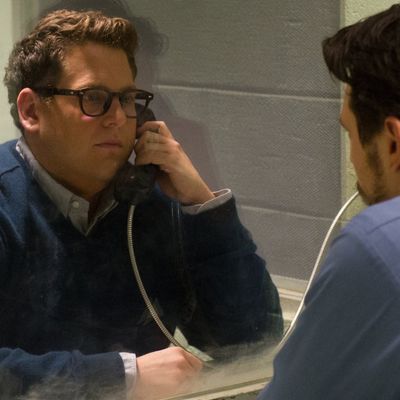
At the start of True Story, New York Times Magazine writer Michael Finkel is caught creating a composite character for a piece on the still-extant African slave trade. At home after his firing and disgrace (upstaged, it turns out, by the revelation of Jayson Blairs exponentially more horrifying journalistic sins a short time later), he gets the bizarre news that a fugitive named Christian Longo has been captured in Mexico posing as  him. Theres strong evidence that Longo (James Franco) murdered his wife and three small children and dumped their bodies in an Oregon waterway. So Finkel  using his peculiar connection  decides to interview this liar who stole the name of a liar. He believes its vital to do so. See, he doesnt know why he was driven to lie in the Times article, and he thinks if he can understand Longo, he can understand himself. He even tells the likely murderer, Im hoping you can tell me what its like to be me.
I believe theres a technical term for a premise like this: ring-a-ding dumb. I suppose its possible that Finkel resembles Longo insofar as they both  insofar as. .. one  one pretended to interview someone who didnt exist, one pretended he was someone who didnt kill his family  No. Sorry. No connection. Its a literary conceit, a hook for a book in which Finkel can simultaneously beat himself up and make you empathize with him. Hes a good (prose) writer; he does a better job selling the premise in print. But being played by Jonah Hill in high-serious mode is a fate I wouldnt wish on Jayson Blair.
Hill is an edgy comic actor who radiates neediness and speaks in interviews of wanting to be taken seriously. This is his idea of a serious performance. His Finkel is an earnest mouth-breather with no journalistic wiles whatsoever. When he meets FrancoÔÇÖs Longo in prison, he looks like a plodding high-schooler. Franco, at least, gives his scenes a dash of welcome perversity, but as usual, he looks as if heÔÇÖs not fully concentrating on the matter at hand, playing (likably) at being an actor instead of actually being one.
Longos defense comes down to the idea that his wife killed the kids and he dumped the bodies because  I didnt quite understand. Hes frankly less convincing than Robert Durst in The Jinx, and the lack of mystery helps dampen what little suspense there is. To compensate, the Brit TV director Rupert Goold serves up snippets of the child killings all the way through, like an arty striptease, on the way to the Big Reveal. Its the sort of movie where there are repeated shots of a doll being dropped in slow motion on a dead (or dying) little girl.
ThereÔÇÖs only one good scene in True Story, though itÔÇÖs the most flagrantly absurd. Felicity Jones has the thankless role of FinkelÔÇÖs supportive wife, but near the end, she shows up at the prison to play Longo music by the Renaissance composer Carlo Gesualdo ÔÇö who brutally murdered his wife and her lover and maybe his infant son. Then she incinerates Longo with her blue eyes and tells him heÔÇÖs not anything like her husband. Big news. SheÔÇÖs fun to watch, though.
This is a good time to explore the theme of social-media-fueled scandal, especially in light of Jon RonsonÔÇÖs new book So YouÔÇÖve Been Publicly Shamed┬áÔÇö which is too sympathetic to Jonah Lehrer but otherwise eye-opening. I wonder if True Story wouldnÔÇÖt be better if Finkel had set aside the bogus doppelg├ñnger theme and sought out the killer to ask, ÔÇ£Why do you seem so impervious to shame?ÔÇØ The correct answer would be, ÔÇ£IÔÇÖm a psychopath,ÔÇØ but thatÔÇÖs at least more informative than anything in the movie. In any case, Finkel and Longo are now partners in celebrity, and thereÔÇÖs nothing that vanquishes shame like being played by an A-list celebrity who thinks youÔÇÖre a fascinating person.


